Lamark Speed Test (English)
Published by on Tuesday, July 12, 2022
Introduction
Lamark is an updated remake of the popular 80s and 90s benchmarking tool Landmark Speed Test by Landmark Research International Corporation.
Lamark Speed Test, requires no installation, no DLL nor component registration, no external dependencies, no purchasing, and its reduced size, makes possible to fit the complete package even in an old-fashioned floppy disk. This makes Lamark the perfect choice for quick and reliable choice while comparing PC performances.
Description
When launched, it starts performing a continuous series of speed tests, including CPU, FPU and Memory. Results are normalized acording to an Intel Pentium Dual Core T2330 at 1,60 GHz, with 2 GB of DDR2-667 memory, where CPU and FPU run at 3200 MHz (1600 MHz each core), and memory has a bandwith of 667 MHz.
Under the Information pane it is displayed current computer information related to CPU/FPU and Memory. It includes number of cores/processors, CPU name and clock speed, total amount of installed memory, and processor stepping.
The rest of values shown, represent the processing power while dealing with CPU operations (integer calculations), FPU operations (floating point calculations), Memory (memory write accesses), and Total results, representing averages of the three ones. Where applied, benchmarks are extrapolated to all system cores/processors in raw synthetic 32 bit execution.
The Submit button, gives the possibility to send your benchmarks and compare them with other users.
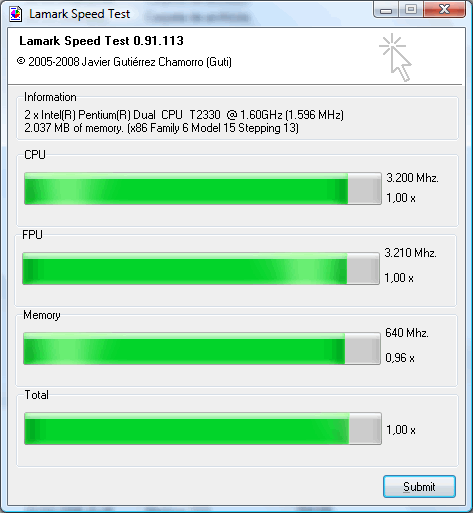
Quick facts
- Blazing fast program execution.
- Very low resource usage while testing.
- Small footprint, can be run from floppy disks, USB devices, hard disks, …
- Quick startup time.
Key features
- CPU speed test.
- FPU speed test.
- Memory bandwidth speed test.
- GDI bandwidth speed test.
- Disk I/O speed speed test.
- Total average speed results.
License
Lamark is totally free, both for commercial, and private usage.
Requirements
- Operating System: Windows NT 4.0, 2000, XP, 2003, Vista, 2008, 7, 8, 2012, 10, 11 (x64 compatible).
- 16 MB. of free memory.
- 600 KB. of disk space available.
Language
Currently Lamark is only localized in english.
Screenshots
Lamark Speed Test under Windows Vista:

Lamark Speed Test under Windows XP:
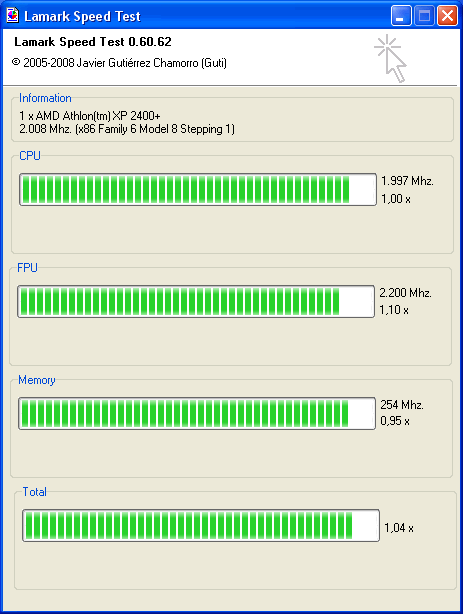
Lamark Speed Test under Windows Mediacenter:
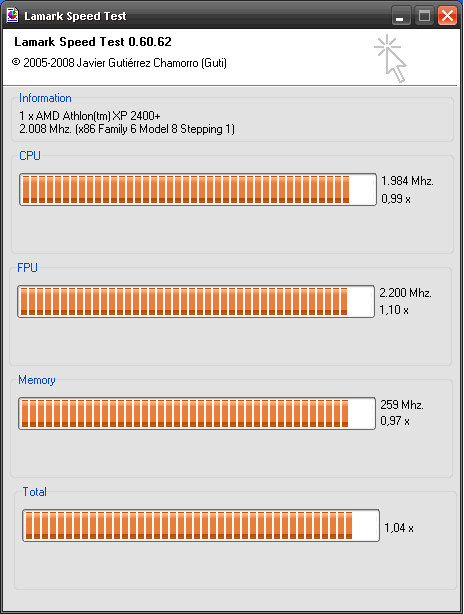
Lamark Speed Test under Windows 2000:
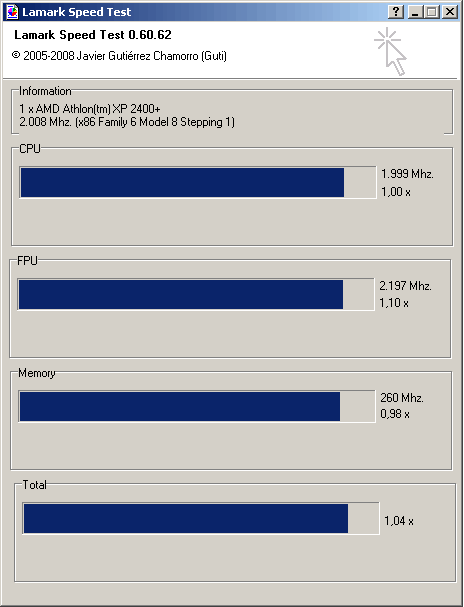
Lamark Speed Test under Kubuntu 9.04 (WINE 1.0):
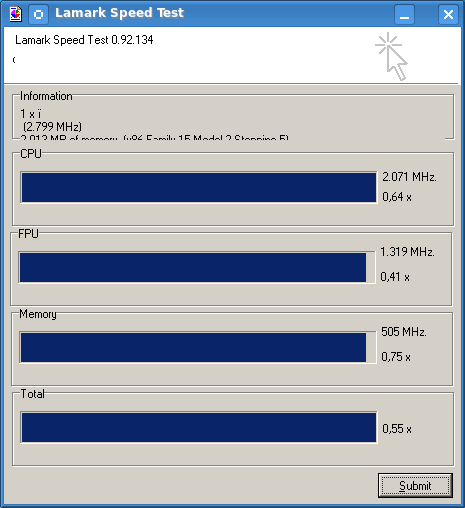
Lamark Speed Test under Ubuntu 10.04 (WINE 1.2):
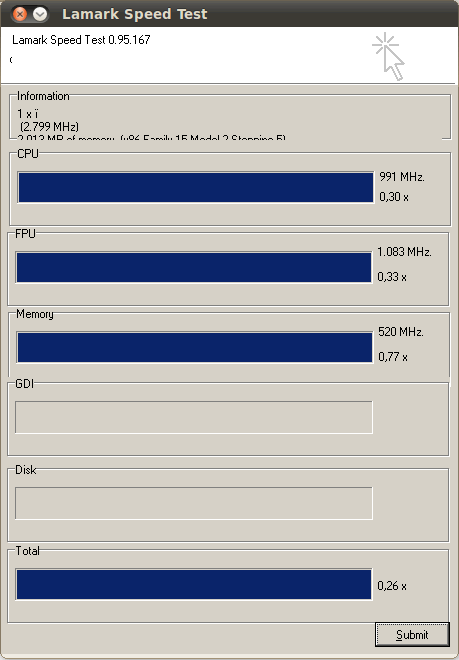
Download
- In ZIP format (1,228 KB.): Ready to be used by uncompressing in any folder.
- Source code (34 KB.): Lazarus 2.2.4 source code.
Sponsors
Results
For indexing guidelines, the following table show performance results of various machines running Lamark Speed Test. If you are interested in older release, you can get them in archived results.
Frequently Asked Questions (FAQ)
Why is my computer getting so low scores?
Take in mind that Lamark Speed Test is a synthetic benchmark, not representing in any way real life scenarios. Lamark tests are hand optimized assembly tests, that intend to push your hardware to the limit. Possibility exists that a low performer Lamark system, gets high performance with real applications, and viceversa.Also make sure your Windows energy saving profile is setup for maximum performance.
Why is my computer getting so high scores?
Probably your computer has good performance with RISC instructions, which are mostly used in Lamark Speed Test, because they represent most common operations executed in programs.
Can I compare results between one Lamark version and another?
Even thought Lamark Speed Test normalizes results with an Intel Pentium Dual Core T2330 reference machine, values obtained can not be compared between different major Lamark versions, since benchmark code, tends to be optimized and modified between releases.
History
- 2022/11/14. Version 1.30.244: Compiled with Lazarus 2.2.4 (FreePascal 3.2.2); Updated to UPX 4.0.1.
- 2012/08/12. Version 1.00.224: Totally rewritten in Object Pascal, and compiled with Lazarus; Windows x64 as well as x86 binaries available: 64 and SSE benchmarks available; compressed with MPRESS 2.19.
- 2009/09/01. Version 0.95.167: GDI performance is doubled, since we consider that are reading and writting; fixed a historical misprecision in total calculation; removed disk benchmark file on exit.
- 2009/08/31. Version 0.95.165: Added GDI performance test; added disk performance test writting using memory mapped access if available to a file in order to assure maximum performance; assembly loops are now aligned in a paragraph instead of in a double word boundary, making CPU, FPU and memory benchmarks more precise; enhanced progress bars to be animated on the first time.
- 2011/02/19. Version 0.96.191: Preparing support for SSE optimized memory test if SIMD is available; modified canonical URL to guti.is-great.org; updated to C++ Builder XE Update 1; updated to UPX 3.07 with ultra-brute compression.
- 2010/07/01. Version 0.95.178: GDI performance is doubled, since we consider that are reading and writting; fixed a historical misprecision in total calculation; removed disk benchmark file on exit.
- 2009/08/26. Version 0.92.138: Updated to C++ Builder 2010.
- 2008/11/20. Version 0.92.134: Updated to C++ Builder 2009 Update 1; source portability improvements; other minor changes.
- 2008/11/02. Version 0.92.130: Proper Hyperthreading detection, scores are not doubled anymore when it is enabled; result submission also includes CPU Speed; old 0.91 results available in the archive; trimmed extra spaces that sometimes ocurred on the information pane; other code enhancements.
- 2008/10/17. Version 0.91.118 Beta: Now users are able to submit its results and compare them with others; memory performance is doing writing data instead of reading, workspace has been reduced, and so minimum system requirements; lots of code refactoring and optimization.
- 2008/10/15. Version 0.90.107 Beta: Results are normalized now to a Intel Dual Core T2330 1,6 Ghz with 2 Gb DDR2-667 memory; even the change in 0.80.101 requiring more elapsed time to get an accurate measure, process is now smoother; enhanced GetTickCount precission by using timeGetTime for better precision; memory size report now supports more than 3 Gb of installed memory in Windows 2000 and later; expanded CPU test; memory test, now uses a bigger testing workspace.
- 2008/10/14. Version 0.80.101 Beta: Important bug introduced in 0.50.45 calculating elapsed time was fixed (not taking care of performance counter frequency), it produced totally wrong results; due to lack of consistency in CPU manufacturer, timmings has been replaced by the old less precise GetTickCount(), major changes has been needed to it; memory test uses MMX if available, else it uses and improved x86 code; rewritten CPU benchmark to make it more complete and paralelizable; added loop alignments to all tests to homogenize results and maximize throughtput; F1 for help file.
- 2008/10/13. Version 0.70.65 Beta: Compacted user interface, 1024×768 is not needed anymore; run in high priority; removed hourglass pointer; improved task scheduling; link to home page; memory information.
- 2008/10/12. Version 0.60.62 Beta: Added information panel; added total panel; removed saving window settings due to issues with UAC; now results shown are extrapolated to all core/CPU installed.
- 2008/10/12. Version 0.50.46 Beta: Unrolled memory access loop.
- 2008/10/12. Version 0.50.45 Beta: Rewriten to use performance counters instead of RDTSC which provides more accurate results in modern CPU; other minor changes.
- 2008/10/11. Version 0.40.42 Beta: CPU and memory calculations has been improved to take better advantage of CPU pipelines; Results has been unified with the reference Athlon XP 2400+ machine, so 0.40 values should not be comparable with other version values; other minor changes.
- 2008/10/11. Version 0.30.31 Beta: Results include a multiplier ratio; numbers are formatted according to regional settings; benchmark is now smootheer; better ini file reading; LZMA compression for reducing EXE size; some code cleanup.
- 2008/09/22. Version 0.20.22 Beta: Reduced Windows memory allocation. Included CHM help file. Fixed EXE icon.
- 2008/09/20. Version 0.20.20 Beta: Minor fixes; upgraded to C++ Builder 2009; compressed with UPX instead of UPack to avoid AV false positives; source code available.
- 2006/01/07. Version 0.10.14 Alpha: Adjusted FPU ratio; included version number in main application; reduced memory and CPU usage when not active.
- 2006/01/05. Version 0.10.12 Alpha: First public release.
Roadmap
Since version 0.91.118 work has started on rewriting Lamark Speed Test with Visual C++ 2008 + MFC instead of the current C++ Builder 2009 + VCL. This is a major task, that would require some time. On the meantime, 0.92 has been released with some improvements.
A preview alpha version of the new Lamark, can be downloaded here (136 Kb. in ZIP format).
After that, several features are in mind:
- x64 native version.
- Autoupdate.
Links
- Official Lamark's website: nikkhokkho.sourceforge.net/static.php?page=Lamark
- Official author's website: www.javiergutierrezchamorro.com.


